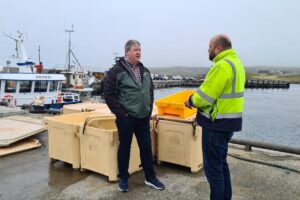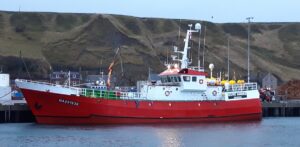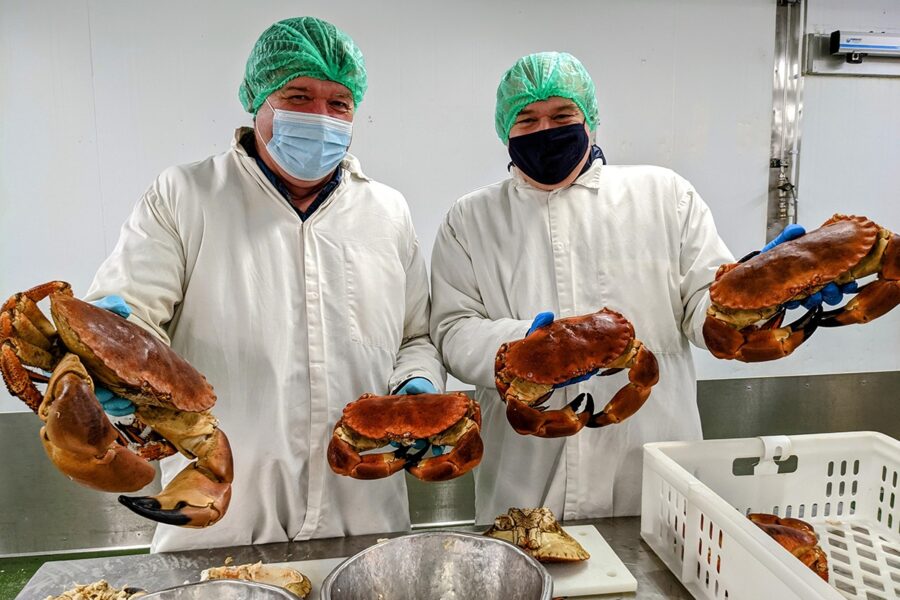Orkney and Shetland MP Alistair Carmichael shares his views on the way ahead
This time last year, MPs had just finished a powerful debate on post-Brexit fisheries management in the House of Commons.
Over 90 minutes, a succession of MPs stood up and outlined the problems that their local fleet had encountered since Boris Johnson had breezed into Brussels on Christmas Eve 2020. The prime minister had taken over the negotiations from David Frost (who had at least acquired a general grasp of the subject) and signed off a deal that for many EU fleets was ‘Christmas come early’.

“On the quayside in Whalsay meeting local people. Whalsay
is at the heart of the Shetland fishing community, and I have been campaigning with them to improve freight capacity, improve working conditions and end the dangerous and unsustainable practice of industrial gill-netting by non-local boats in our waters.”
It does not matter what side you were on in the Brexit debate. What matters is where we go from here.
The debate last year summed up what I hear from fishermen at home in the Northern Isles.
This is an industry yet again facing an uncertain future – and that was before the price of fuel sky-rocketed and interest rates started to creep up to tackle inflation.
Desperation in the industry is nothing new. One of the formative moments in my work as an MP was when I attended a mass meeting of the local fleet in Lerwick in December 2002. The then fisheries minister had brought back a deal from the Fisheries Council that could only spell ruin. I had always thought that the Common Fisheries Policy was bad policy and bad politics, but now – on the Friday before Christmas – I was confronted with the human cost of that madness.
The desperation in that room was palpable, and it haunts me to this day. What followed was a grim few years. We saw decommissioning paired with impenetrable regulations around days at sea, as the whitefish fleet was forced into an industrial version of the Hunger Games.
We got through it. What emerged was a smaller, leaner fleet, but one that was still in the game.
For years we were able to blame Brussels for our difficulties – usually with justification. Now, however, we have to look closer to home for those who are responsible.
Week after week I hear the same story told in different terms.
I hear about enforcement agencies that target local boats while leaving those fishing under foreign flags in our waters to do as they wish.
I hear about scientific advice that does not match what fishermen are catching in their nets.
I hear about local whitefish boats pushed out of their traditional fishing grounds by Spanish gill-netters who not only prosecute one of the most unsustainable methods of fishing, but leave behind a mess of plastic netting that will be there for centuries to come.
I hear about acts of criminal recklessness visited on anyone brave enough to stand up to these behemoths of the sea.
What hurts people most is that those who made the grand promises of past years are still in a position to help. They just seem reluctant to pick up the phone now when the industry calls.

“Large gill-netters in Scrabster, where they take on supplies and consign their catches to EU markets. A harbour policy of ‘one in, one out’, requiring proof that old gill-nets are being landed for recycling, before new ones can be taken aboard, could be a huge help in reducing ghost fishing issues.”
The deal that Boris Johnson brought back was a massive disappointment. What has followed since, however, has been the real betrayal – and now there is no one else to blame.
Many that I speak to in fishing communities around the coast say the same thing. They feel used and angry.
Ministers speak vaguely about putting it all right in 2025. They may or may not do so. I confess to being sceptical.
What they can do now is start listening to the industry and making a difference in those things that we do control.
I cannot imagine my communities without a fishing industry. I suspect that a generation ago MPs from Yorkshire would have said the same about coal mines. No industry has a God-given right to survive. We know that others will take our place if we are not here.
When parliament returns in September, we shall reprise our debate. This time it must be more than a collective greeting session.
The industry has got to come forward with a united message. We have two months to prepare.
The fishing industry’s future now lies in the hands of our own governments. More empty promises simply will not do. What we do know, however, is that people are ready to take the opportunities that come. Give the industry a viable future – they will do the rest.
Time to tackle gill-netting
What is it going to take for our governments to end industrial- scale gill-netting?
Last week, the SNP fisheries spokesperson earnestly assured me that it is something that the SNP/Green coalition in Scotland is ‘of course looking at’. Apparently it is something that will be dealt with by Marine Protected Areas. I guess we have to wait and see how.
The practice itself is environmental madness, and about as unsustainable as it is possible to imagine. It blocks off vast tracts of sea from local boats, and leaves in its wake tonnes of plastic litter which remain on the seabed – that is, until it is removed by the same local boats that have been bullied off their grounds.
It is an issue that I raised in the debate around the Fisheries Act back in October 2020, in the wake of footage showing the Spanish gill-netter Pesorsa Dos coming close to ramming the Shetland boat Alison Kay to defend the Spanish boat’s gill-nets.
Following the abject failure of various authorities to tackle this recklessness, I drafted amendments to give our own MCA powers to deal with it.
I was assured by the UK fisheries minister that such amendments were unnecessary, as we could rely on the flag states to punish this sort of dangerous conduct. It was already obvious to everyone that this had failed.
Another Conservative MP described my amendments as ‘well intentioned’ but claimed we ‘already have such provisions in place’.
Almost two years later, and the Fisheries Bill is now the Fisheries Act, but still we are no closer to giving our fleet the protection that it needs between the 12- and 200-mile limits.
Sooner or later we are going to see a tragedy of some sort. Is that what it is going to take to finally see the law change?
This story was taken from the latest issue of Fishing News. For more up-to-date and in-depth reports on the UK and Irish commercial fishing sector, subscribe to Fishing News here or buy the latest single issue for just £3.30 here.








